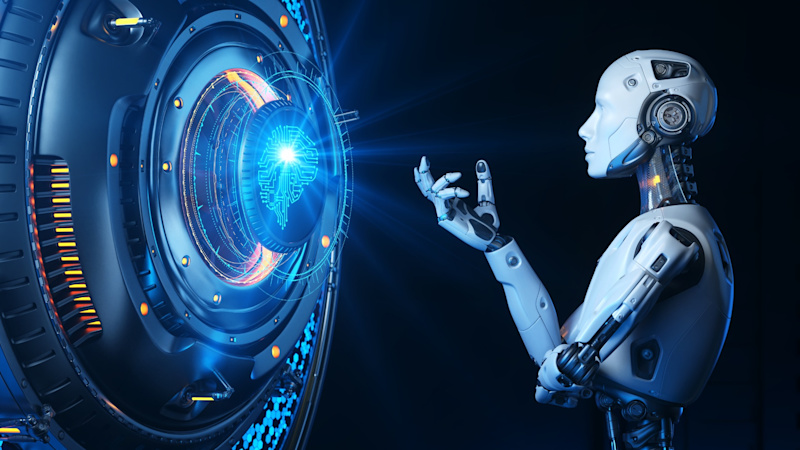Recently, Creative Design circles have been abuzz about the capabilities of AI for end users in design production - especially with the launch of Canva's suite of new brand management products and AI-powered design tools. Midjourney also paused free trials amid huge demand and abuse.
Over in web development and programming, GitHub updated its AI code generator for better information security.
These updates are the results of community conversations about what end users need and how to be compliant with regulations. Plenty of feelings have been expressed too – from positives like excitement and the feeling of having support for admin work to the less than favourable anxiety and existential dread.
One of the biggest controversies so far is whether it really does learn (in the same way a human can) or only does what it is programmed to do.
But how it works and what skills you need to become an AI or ML specialist - that is, a human who trains the machine - remain a work in progress that communities of technologists are figuring out together.
"How do I start training in AI?" We share the latest information for those who feel curious about how they can apply their own skills to it.
Hopefully, more soon-to-be tech specialists who manage the data and guide the model can be at the forefront of catching any biases and incorrect information and even harness the technology for good. Learn why you should consider a career in AI here.
How does artificial intelligence work?
Artificial intelligence (AI) refers to the ability of a machine or computer system to mimic human-like intelligence and perform tasks that typically require human intelligence. There are various approaches to AI, the most common of which are machine learning (ML) and deep learning. Here's a high-level overview of how AI works:
Data Collection: AI systems need large amounts of data to learn from. This data can be structured (e.g., databases) or unstructured (e.g., text, images, videos).
Data Preprocessing: Cleaning, organising and organising collected data for analysis. This step involves removing noise, handling missing values, and transforming data into a suitable format for machine learning algorithms. The process resembles how sales and marketing teams update spreadsheets or contacts lists with newer or correct information.
Model Training: ML specialists use machine learning algorithms to train models on preprocessed data. During training, the model learns patterns and relationships in the data by adjusting its parameters iteratively. Their goal is to optimise the model's performance on the given task, such as image recognition or language translation.
Model Evaluation: Once the model is trained, specialists evaluate it using a separate set of data it has not seen before. This evaluation helps determine the model's accuracy, performance and generalisation ability. If the model's performance is unsatisfactory, it may be retrained with different parameters or architecture.
Model Deployment: After the model is trained and evaluated, it can be deployed in a production environment to make predictions or perform tasks. Depending on the intended use, this could involve integrating the trained model into a software application, a website, or an embedded system.
Model Monitoring and Maintenance: AI models require continuous monitoring for accurate and reliable performance. If the model's performance degrades over time, it may require updates or retraining to maintain its accuracy and effectiveness.
It's important to note that AI is a rapidly evolving field in which communities of specialists are collaborating. Various techniques, algorithms, and frameworks are available depending on different use cases. How AI works can vary in approaches such as supervised learning, unsupervised learning, reinforcement learning or other specialised techniques.
Where to learn about artificial intelligence?
If AI and ML specialists train models and computers to learn using algorithm, who trains the trainer? AI and ML training is available in Sydney, Melbourne, Adelaide, Brisbane, Canberra and Perth or online with instructors from the tech sector.
Gartner forecasts that the artificial intelligence sector will grow just over 21 per cent in 2023 and beyond. So, learning offers a way to futureproof your career and your projects.
Regarding prerequisite skills, a basic understanding of data management and programming languages like Python, R Programming, Java® and C++ help. Our AI and ML technical instructors also say they were hooked through their love of mathematics, statistics, calculus, probability and linear algebra.
But the field really does combine Computer Science and Mathematics with Neuroscience, Psychology, Sociology, Economics and Communication. So, anyone has a fair chance of entering the discipline, bringing something to the table and helping shape policies and future learning pathways.
Microsoft AI-102T00 - Develop AI Solutions in Azure
This course is for software developers wanting to build AI-infused applications that leverage Azure Cognitive Services, Azure Cognitive Search, and Microsoft Bot Framework. The course will use C#, Python, or JavaScript as the programming language.
Microsoft AI-900T00 - Microsoft Azure AI Fundamentals
This course introduces fundamental concepts related to artificial intelligence (AI), and the services in Microsoft Azure that can be used to create AI solutions. The course is not designed to teach students to become professional data scientists or software developers but rather to build awareness of typical AI workloads and the ability to identify Azure services to support them. The course offers a blended learning experience that combines instructor-led training with online materials on the Microsoft Learn platform (https://azure.com/learn).
Learn AI and ML with Lumify
Lumify Work offers AI and Machine Learning courses so you can become experts in using powerful tools to find critical insights within a plethora of information. Our fully certified trainers utilise the latest authorised courseware to deliver globally recognised courses and certifications.
Lumify Work is a leading provider of corporate IT training. Visit one of our ten fully equipped training campuses with 90 classrooms in key business centres around Australia, New Zealand and the Philippines. Full HD video and audio create a virtual classroom experience and access to our pool of expert trainers.
With the Lumify Anywhere platform, you can complete AI training from the comfort of your home, from one of our campuses – or wherever it suits you best.
Download our eBook to get started with your AI and ML journey.








